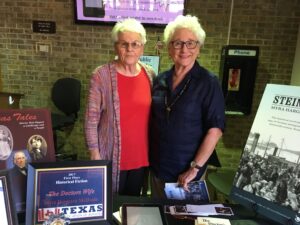When an old story comes from many sources, it is difficult to glean the exact details. In this case, we know a man was scalped and lived to tell about it

Farmers like Josiah Wilbarger and his wife who settled the west accepted the ever-present danger of Indians hostile to white encroachment into their homelands. Surveyors mapping the land grants for the early colonists faced an even greater threat because the Indians feared and hated surveyors, calling their compass “the thing that steals the land.”
In addition to farming his land, part of an 1832 grant, which lay a few miles east of the present city of Austin, Josiah Wilbarger worked as a surveyor. Most accounts say that in August 1833 Wilbarger and his four friends were on a surveying trip and stopped near Pond Spring to have lunch.
The attack came suddenly when a large band of Indians swooped down with rifles and bows, killing one man, shooting another in the hip, and hitting Wilbarger in the calf of his leg.
Men scrambling to mount their horses, saw Wilbarger take an arrow to his neck. Convinced Wilbarger did not survive, his friends raced several miles to the protection of the Reuben Hornsby home. They planned to return the next morning for the bodies after the Indians finished their scalping ritual.
That night Mrs. Hornsby dreamed of Wilbarger sitting under a tree seriously injured. She woke her husband who dismissed her as overreacting to all the excitement. Mrs. Hornsby dreamed a second time, even recognizing the site where Hornsby lay naked.
It’s not clear when the men returned for Wilbarger. Some say Mrs. Hornsby insisted they leave immediately; other versions claim the men waited until morning. Either way, Mrs. Hornsby provided a blanket saying, “Take this to make a stretcher. He’s not dead but he can’t ride.”
They found him as Mrs. Hornsby claimed, scalped and near death. Placing his naked body on the blanket, they carried him back to Mrs. Hornsby who applied poultices of wheat bread and bear grease.
When Wilbarger grew stronger, he told of how the arrow in his neck paralyzed him, making him unable to feel pain as the Indians hovered about believing he was dead. One of the Indians carved around Wilbarger’s scalp. When he gripped the hair to it snatch it off, the ripping sounded like a mighty clap of thunder.

Feigning death, Wilbarger waited until the Indians finished all the scalping rituals and left. Some stories say Wilbarger pulled the arrow from his neck and passed out. When he awoke, he blazed with fever and crawled to the nearby spring to cool his pain-racked body. He started crawling toward the Hornsby house but made it only as far as the tree where he passed out again.
Upon waking he saw his sister who lived in Missouri come toward him saying for him not to worry, help was on the way. She walked away toward the Hornsby house.
Several months later, word came that his sister died the day before the Indian attack. The family buried her on the day her image appeared to Wilbarger.
A hole about the size of a large silver dollar in Wilbarger’s scalp never healed. He wore silk bandages his wife cut from her wedding dress to protect his head for the next eleven years. He died at his home on April 11, 1844, after striking his head on a low beam in his cotton gin.
John Wesley Wilbarger, Josiah’s brother, is among the many tellers of this tale. A Methodist minister and sometime surveyor, John Wesley spent twenty years collecting accounts of Indian atrocities from sources he claimed were always reliable. In 1889 he published Indian Depredation in Texas, a 672-page piece of Texana filled with 250 separate stories of attacks and counterattacks.
The book came out at a time when academics started telling a more balanced account of Indian culture and motives. John Wesley Wilbarger, however, painted Indians as unredeemable savages.
An interesting aside related to John Wesley Wilbarger’s book is the thirty-four woodcut illustrations recently attributed to Austin resident William Sydney Porter, better known as O. Henry.

What a remarkable story. Thanks for writing it.
Fred R. Jones
7345 Rolling Acres Trail
Fair Oaks Ranch, TX 78015
(830) 981-4848
(210) 355-3229 – mobile
Thanks, Fred. I’m glad you like the story and glad for the connection.
Interesting account, Myra. I wonder if Josiah is the person Wilbarger County is named for.
Yes, Wilbarger County was named for Josiah and his brother Mathias.